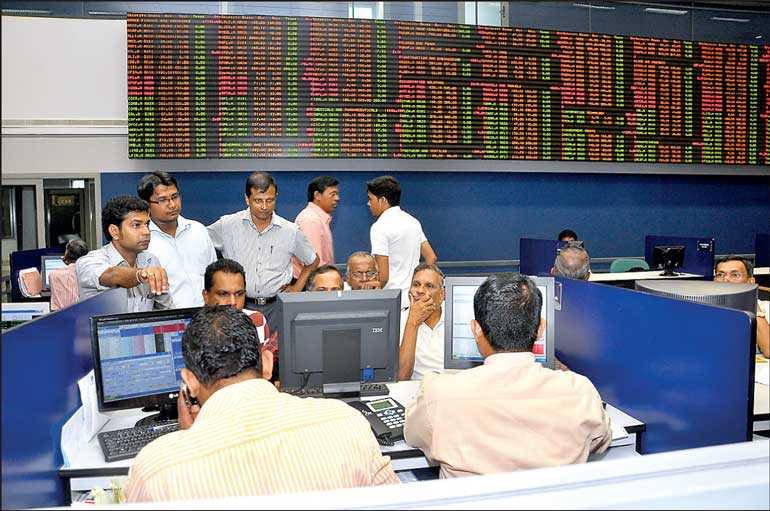Friday Feb 27, 2026
Friday Feb 27, 2026
Monday, 1 June 2020 00:00 - - {{hitsCtrl.values.hits}}

Four experts yesterday were unanimous that valuations at the Colombo stock market remain very attractive from a long-term perspective despite the impact of COVID-19, suggesting the time was ideal to buy fundamentally strong listed equities.
 |
Hong Kong-based Asia Frontier Capital Fund Manager
|
 |
Brandix Group Finance Director Hasitha Premaratne |
 |
Acuity Knowledge Partners Director Chanakya Dissanayake |
 |
SC Securities Head of Research Charitha Gunasekere |
The four experts were Hong Kong-based Asia Frontier Capital Fund Manager Ruchir Desai, Brandix Group Finance Director Hasitha Premaratne, Acuity Knowledge Partners (formerly Moody's Analytics Knowledge Service) Senior Director Chanakya Dissanayake, and SC Securities Head of Research Charitha Gunasekere, who spoke at the webinar titled "Attractiveness and Opportunities in the Colombo Stock Exchange."
The Colombo Stock Exchange dropped by over 30% in the first two weeks of its re-opening on 11 May, after the 7-week closure on account of the COVID-19 pandemic. However, since then, it has recovered by 14%, as buying has returned based on attractive valuations and a long-term upside view.
The webinar, organised by SC Securities and the Daily FT, endeavoured to deep-dive into the gains of the market in the past two weeks, the new attractive valuations, and to get insights to the fundamentals as well as future challenges and opportunities in the economy and the stock market.
Hong Kong-based Asia Frontier Capital Fund Manager Ruchir Desai said in terms of valuations, CSE has remained very attractive on a longer-term view despite various challenges. He also said the strategic geographic location of Sri Lanka was another positive factor, whilst trade and tourism can boost future growth.
"Overall prospects look good once Sri Lanka overcomes the challenges of the COVID-19 pandemic and ensuring political stability," Desai told the webinar.
He said his Fund has not sold post-COVID-19 since the valuations are very cheap. “However to increase weight on Sri Lanka, the country needs to address some of the well-known medium term-challenges,” he said.
“Those who sold may have done so largely as a response to global sell-out across emerging and frontier markets and redemptions, and not because of Sri Lanka being a bad story,” Desai pointed out. Brandix Group Finance Director Hasitha Premaratne said in the past year, multiple issues posed challenges to the outlook of both Sri Lanka and the economy.
He was of the view that the 30% drop in the market when it re-opened after the COVID-19 closure was circumstances-driven and reactive rather than based on a longer-term view. He added investors also stepped up buying, realising the attractive valuations and sensing a future upside.
“COVID-19 did impact the current fundamentals, but the question of whether it has changed the long-term fundamentals is another issue, and whether the fallen prices truly reflected the fundamental change or over-reflected,” Premaratne argued.
He said that given the low interest rate scenario, investors should take a one and half to two year view, or beyond, on fundamentally sound stocks to truly benefit from the market, given the resilience of the country and companies. "If there are attractive trading opportunities that come about in the interim do seize those," he added.
Acuity Knowledge Partners (formerly Moody's Analytics Knowledge Service) Senior Director Chanakya Dissanayake observed Sri Lanka is facing many short- to medium- term economic risks, and over the past five years the equity valuations have progressively come down especially after the Easter Sunday terror attacks last year and the COVID-19 pandemic today. "The 11 May bottoming out was a watershed moment for CSE," he added.
However he pointed out some blue chips in the S&PSL20 index fell to a valuation of 5.5 times trailing price to earnings, and some systematically important and profitable banks dropped 30-40% of their book value.
“It was said these are similar to liquidation value. Some of these valuations were not seen even during the peak of the war,” he added, driving home the point of the attractiveness of select listed equities.
Dissanayake suggested that the notion of whether there will be a further drop in valuation is determined by a doomsday view.
He was of the view that most investors have by now factored in the COVID-19 impact on blue chips resulting in a fresh round of buying. “Current valuations represent, potentially, another once-in-a-generation buying opportunity,” he noted.
SC Securities Head of Research Charitha Gunasekere made a compelling case that the time was right to invest in the Colombo stock market.
He said Sri Lanka’s Price Earnings was 9 times, by far the most attractive in comparison to some of its peers. He revealed that 71% of the companies listed on the CSE are trading at Price to Book Value of below 1 time and 35% of trading at Price to Earnings ratio of 8 times based on four quarter trailing earnings.
All the panellists at the webinar moderated by Daily FT Editor Nisthar Cassim shared a host of suggestions on the way forward for COVID-19-hit Sri Lanka, the market, and the companies. They also stressed that the time was opportune to implement much-needed and longstanding macroeconomic and institutional reforms, and to pursue best practices. The importance of Sri Lanka harnessing global and regional support and from multilateral agencies was held as key to manage the debt repayment challenge in the short-term and boost reserves via exports, tourism and services in the medium-term.
A detailed report on the full webinar will be published in the Daily FT at a future date.